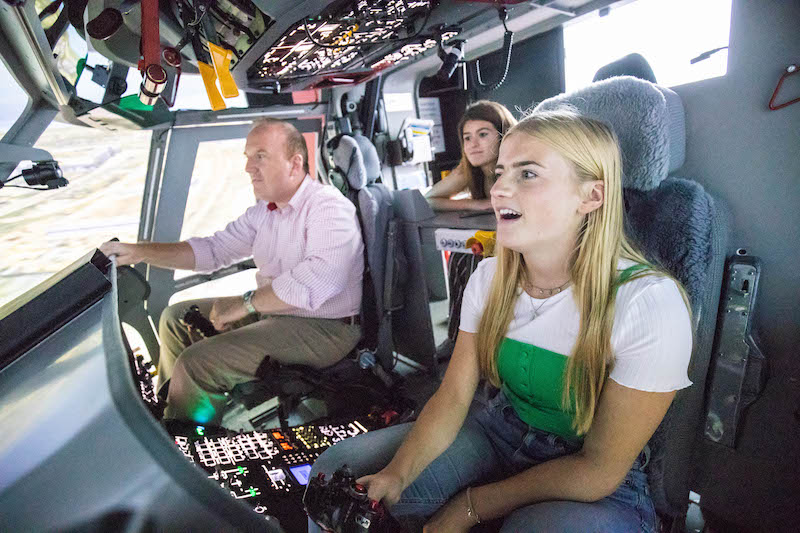Sixth form should go beyond A levels
Posted on 10th Dec 2021 in School News, Sixth Form, Which School?
Liz Laybourn, Head of Burgess Hill Girls, explains the school’s two-year BOLD programme
While sixth form life has long been squarely focused upon public exams and how to get top grades, employers and universities have quietly been searching for something more that sets their new recruits and undergraduates apart.
And in an era where top grades have become more commonplace, this hunt for that elusive something extra has become even more pronounced.
Only this week news has emerged that universities, who long since abandoned interviewing candidates for most courses as numbers of applicants grew ever higher and caps on course numbers were raised, are now hinting that they may return to them. It is, they say, becoming harder and harder to differentiate students (particularly through the Covid years when assessed grades replaced exams).
So, Burgess Hill Girls’ BOLD programme, designed to prepare our young women for the wider world, has become an essential tool. The programme is dedicated to drawing out soft skills as well as helping to construct a platform of confidence and psychological wellbeing for each girl.
Lasting across the two years of sixth form, the programme complements their academic work, nurturing in them abilities to independently research, challenge accepted norms and move on from simply absorbing knowledge to interpreting and applying it. The result each year is a cohort that moves on equipped not just with impressive exam results but also the social, interpersonal and leadership skills that will help them become contributors to society and affect positive change.
The core academic offering at Burgess Hill Girls allows students to study three A levels that will ensure they meet the demands of the most competitive academic degree courses plus an Extended Project which gives girls the opportunity to show how they can think innovatively and independently. Wrapped around this, our BOLD programme then offers tutorial sessions, assemblies, and classroom-based training.
The programme has four strands.
The first is ‘Beyond’, which sees girls venture beyond their A level and EPQ study to engage in super-curricular activities which could be anything from extra reading and research in areas of interest to carrying our work experience and getting involved in immersive experiences relevant to their ambitions. Our tutors will help the girls organise and shape their activities, careful always to offer advice but still allowing the girls to make their own choices so that they develop their initiative and explore their own interests.
The second strand we call ‘Opportunities’ and it is where we ensure that girls are fully aware of how to research and understand what their next steps might be after leaving school. All the girls’ post-A level options are explored, including a thorough grounding in how the Universities and Colleges Admissions Services (UCAS) works, time given over for university visits and course research and guidance on how to research degree apprenticeships and other ways to access higher education.
The next strand has a ‘Leadership’ theme. We help the girls to seek out and experience opportunities which will nurture their abilities in this much-sought-after soft skill and as a springboard they take part in a dedicated leadership training residential trip to Scotland in the weeks that follow their GCSE exams.
The final part of the jigsaw is our ‘Development’ strand which focuses on girls’ individual attributes and suggests getting involved in community service and extra-curricular activities. We run sixth form vivas (one-to-one interviews) which mean the girls and their teachers can evaluate their personal and academic growth as they head towards adulthood and the wider world.
It is important to us that our girls emerge from the school informed about the world around them and the politics that makes it turn. To this end, we run a Washington DC Residential. The trip takes girls to the hub of world politics but also allows them to explore the social and cultural side of the city as well as visiting its scientific and artistic institutions.
The school also has a thriving visitor speaker programme which sees achievers from the world of science, art, industry, academia, fashion, and media offer valuable lessons – from how they achieved their ambitions to how they have made useful contributions to society. A series of life skills lessons complement these talks and complete the BOLD programme.
One of the many unfortunate effects of the pandemic is a bottleneck of applicants for the country’s top university courses, apprenticeship degrees and entry-level jobs. Whether a pupil has dreams that require further academic study or immersing themselves in business, there has never been a more important time to develop the skills to showcase what we know she is capable of. The BOLD programme is designed to complete the picture of each pupil, allowing them to reveal not only that they are accomplished learners with good qualifications but that they understand how to work alongside others, collaborating and innovating as they go.
This article first appeared in the 2022 edition of Which School? You can read the new edition here: